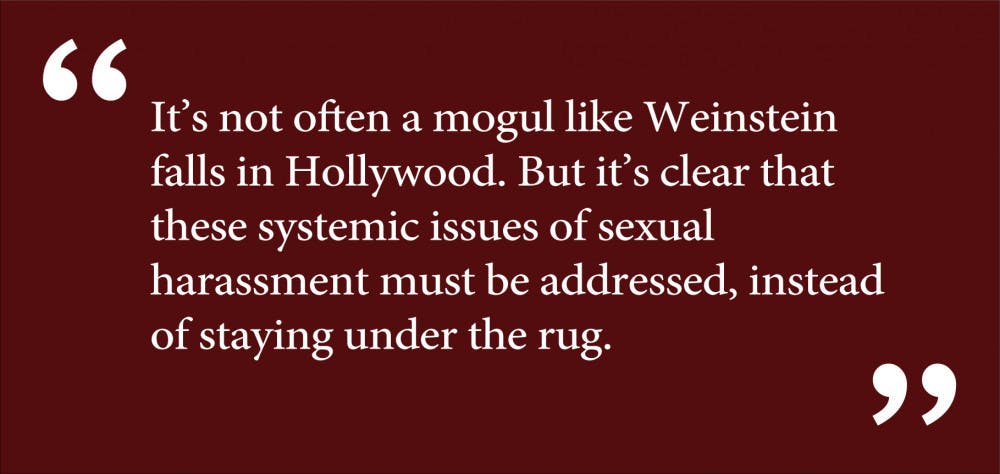By now, you have probably heard of the news that rocked Hollywood. On Oct. 8, the Board of Directors of the Weinstein Company fired its co-founder and namesake, Harvey Weinstein, after several allegations of sexual assault and harassment came to light. The allegations, come from current and former employees, as well as multiple folks within the film industry. A New York Times investigation uncovered that Weinstein, cofounder of Miramax and the Weinstein Company, has reached at least eight settlements with women whom he has harassed. These settlements were meant to ensure their silence. Weinstein’s exit has since been the talk of Hollywood, spoken in hushed tones and in exclamations in bars, streets and film sets everywhere.
For at least three decades, Weinstein has been making unwanted advances on women. That Weinstein’s misdeeds have taken this long to reach the public is evidence of a culture of complicity in Hollywood and beyond. This episode has merely strengthened the stereotype that members of the film industry protect and cover each other.
Since the New York Times piece first publicized these allegations, many have condemned Weinstein. Gwyneth Paltrow, Angelina Jolie, Kate Beckinsale, Léa Seydoux and Ashley Judd are just a few of the people who have since shared their encounters with Weinstein. Fellow actresses Lena Dunham and Mayim Bialik have written columns in the New York Times following the news. Other columns have been quick to point out that Hollywood consistently condemns Trump for his behavior toward women, but even as one of their own has behaved similarly for years, Hollywood has been silent.
It’s not often that a mogul like Weinstein falls in Hollywood. But it’s clear that these systemic issues of sexual harassment must be addressed instead of staying under the rug. The public backlash has prompted a third of the all-male board of the Weinstein Company to resign. The Academy of Motion Picture Arts and Sciences, Hollywood’s highest governing body, also expelled Weinstein recently. With reports that people within the Academy and the Weinstein Company knew of his actions, these measures seem to be motivated just as much by PR as by genuine disgust with Weinstein. The reports highlight a tolerance for this behavior so long as it takes place behind closed doors.
Yet despite all the fierce criticism, Weinstein still, surprisingly, finds defenders. In another controversial response to the news, fashion icon Donna Karan had this to say: “You look at everything all over the world today and how women are dressing and what they are asking by just presenting themselves the way they do. What are they asking for? Trouble.” Actress Lindsay Lohan posted an Instagram video in support of Weinstein, saying: “I feel very bad for Harvey Weinstein right now ... He’s never harmed me or done anything to me. We’ve done several movies together. And so I think everyone needs to stop.” Both Karan and Lohan miss the mark with their statements. Lohan believes Weinstein can’t be guilty of harassment because he never harassed her, which is appalling. These incognizant and naive mindsets excuse the behaviors of people like Weinstein. Given that Hollywood has been hiding these assaults for so long, celebrities should not try to rationalize or defend them any further.
As students and citizens, it is our responsibility to voice our concerns against sexual harassment. Actress Alyssa Milano has restarted a massively popular movement on social media, first coined by activist Tarana Burke 10 years ago, by using the phrase “Me too,” which gives a platform for victims of sexual assault and harassment to speak out.
Lohan has since deleted her video and said, “As someone who has lived their life in the public eye, I feel that allegations should always be made to the authorities and not played out in the media.” The problem is not that allegations aren’t being made to the authorities — allegations aren’t being made at all, which is why movements like “Me Too” are extremely powerful. While it’s not the only way to cope with sexual harassment, movements like “Me Too” are one option for people to have a platform and a voice. Nothing excuses Weinstein’s behavior or the silence of people who knew of it, and it will take more time to deconstruct the culture of complicity within Hollywood and beyond, but it is a step forward.
Zander Kim ’19 can be reached at alexander_kim@brown.edu. Please send responses to this opinion to letters@browndailyherald.com and other op-eds to opinions@browndailyherald.com.





